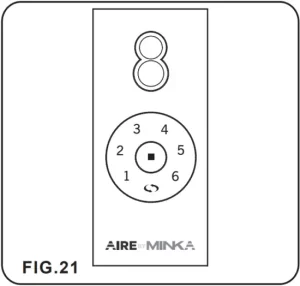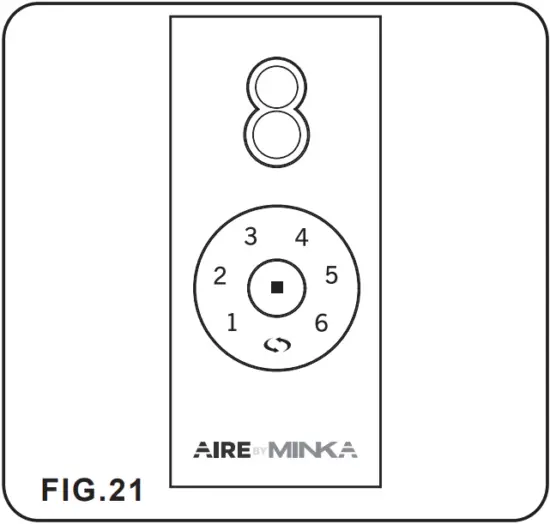
Remote Control only: Install an A23 12 volt battery (included). To prevent damage to transmitter remove the battery if not used for long periods of time.
Your DC brushless motor is equipped with a self learning frequency function remote control. Restore power to ceiling fan and test the transmitter as below for proper operation: ( Fig. 21)

A. 1, 2, 3, 4, 5 and 6 button:
These six buttons are used to set the fan speed as follows:
1 = minimum speed
2 = low speed
3 = medium low speed
4 = medium speed
5 = medium high speed
6 = high speed
B.  Reverse button:
Reverse button:
This button is used to change the direction of the rotation of the blades; Counter clockwise for summer weather operation or clockwise for winter weather operation
C.  button:
button:
This button turns the power Off to the Fan.
D.  Button:
Button:
fans that feature an UP light (  button) and a DOWN light (
button) and a DOWN light (  button) that are controlled independent of each other; Press and release the button for the desired light to turn the light ON or OFF. Press and hold the button to set the desired light brightness. The light will cycle between bright and dim settings as long as the button is pressed. The light key has an automatic auto-resume feature that allows the light to remain at the same brightness as the last time it was turned off.
button) that are controlled independent of each other; Press and release the button for the desired light to turn the light ON or OFF. Press and hold the button to set the desired light brightness. The light will cycle between bright and dim settings as long as the button is pressed. The light key has an automatic auto-resume feature that allows the light to remain at the same brightness as the last time it was turned off.
PAIRING PROCESS
 NOTE: The pairing function will only mandate within 60 seconds when turning the fan’s AC power ON.
NOTE: The pairing function will only mandate within 60 seconds when turning the fan’s AC power ON.
- Select desired frequency from the back of transmitter.
- Press the transmitter’s “
 ” button, and hold the “
” button, and hold the “ ” button for over 5 seconds. Once the receiver has detected the frequency, the fan will automatically begin to operate and start to run for 10 seconds. If a light kit is installed, the light will blink two times.
” button for over 5 seconds. Once the receiver has detected the frequency, the fan will automatically begin to operate and start to run for 10 seconds. If a light kit is installed, the light will blink two times.
NOTE: During self calibration test, the remote will be non-function.
NOTE: The learning frequency function and self calibration test will continue to retain the last set frequency and calibration set even when the AC power is shut off. If the frequency is changed the self calibration test will occur again.
- Lock position: The DC motor has a built-in safety against obstruction during operation. The motor will get locked and disconnect power for 30 seconds if interruption occurs. Please remove obstacles before re-setting.
- Over 40W protection: When the receiver detects motor power consumption which is greater than 40W, the receiver’s power will stop and operation will be immediately discontinued. Turn the receiver power on after 5 seconds.
- “1” and “ON” dip switch: The “1” selection is the light dimmable selection and is to be used with all bulbs except for CFL bulbs. The “ON” selection is For CFL bulbs.
This device complies with Part 15 of the FCC Rules. Operation is subject to the following two conditions:
(1) this device may not cause harmful interference, and
(2) this device must accept any interference received, including interference that may cause undesired operation.
Changes or modifications to this unit not expressly approved by the party responsible for compliance could void the user’s authority to operate the equipment.
NOTE: This equipment has been tested and found to comply with the limits for a Class B digital device, pursuant to Part 15 of the FCC Rules. These limits are designed to provide reasonable protection against harmful interference in a residential installation. This equipment generates uses and can radiate radio frequency energy and, if not installed and used in accordance with the instructions, may cause harmful interference to radio communications.
However, there is no guarantee that interference will not occur in a particular installation. If this equipment does cause harmful interference to radio or television reception, which can be determined by turning the equipment off and on, the user is encouraged to try to correct the interference by one or more of the following measures:
Reorient or relocate the receiving antenna.
Increase the separation between the equipment and receiver.
Connect the equipment into an outlet on a circuit different from that to which the receiver is connected.
Consult the dealer or an experienced radio/TV technician for help.
This device contains licence-exempt transmitters)/receiver(s) that comply with Innovation, Science and Economic Development Canada’s licence-exempt RSS(s). Operation is subject to the following two conditions:
(1) This device may not cause interference.
(2) This device must accept any interference, including interference that may cause undesired operation of the device.